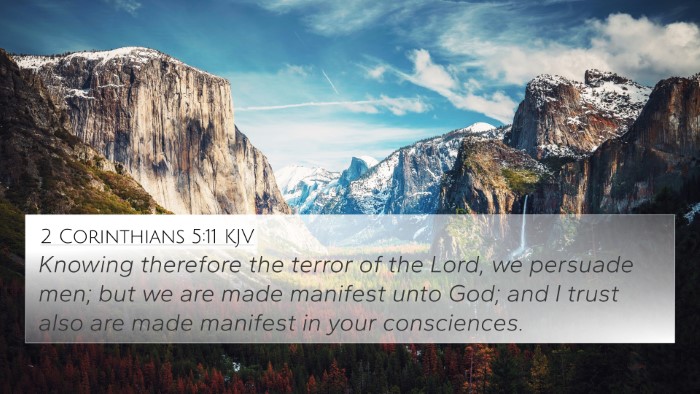Meaning and Interpretation of Job 31:23
Job 31:23 states: "For destruction from God was a terror to me, and by reason of His highness I could not endure." This verse encapsulates Job’s deep reverence for God and his fear of divine judgment. The insights drawn from public domain commentaries, such as those by Matthew Henry, Albert Barnes, and Adam Clarke, provide a profound understanding of this verse within the broader context of the Book of Job and its themes.
Overview
Job, a righteous man enduring immense suffering, makes this declaration as part of his final defense before his friends. His fear of God’s judgment not only reflects his piety but also highlights the weight of his afflictions, pointing to the connection between divine justice and human suffering.
Commentary Insights
Matthew Henry’s Commentary: Matthew Henry interprets this verse as Job’s acknowledgment of God’s omnipotence and the inherent fear that accompanies such recognition. Job felt a burden from the thought of divine retribution. His terror was not merely of physical destruction but also of a spiritual separation from God’s favor, underscoring the seriousness Job attributes to sin and the divine consequences thereof.
Albert Barnes’ Notes: Barnes expands this by exploring the psychological state of Job during his trials. He points out that Job’s declaration shows he was profoundly aware of God’s justice. He feared not only the direct punishment but also the implications of being abandoned by God. This perspective leads to a broader thematic connection within the Scriptures, where God’s judgment is associated with His holiness.
Adam Clarke’s Commentary: Clarke suggests that Job’s fear is rooted in a total understanding of God’s character. To Job, the thought of divine punishment loomed large, reflecting an acute awareness of his actions and decisions in life. Clarke ties this sentiment to broader Islamic themes of God’s mercy and justice, which is a common narrative across sacred texts.
Thematic Connections
Within this verse, several themes are woven that can be interpreted and analyzed through cross-referencing other Bible verses:
- Fear of God: Proverbs 9:10 - "The fear of the Lord is the beginning of wisdom." This highlights the foundational aspect of reverence for God in one's understanding of life.
- Divine Judgment: Hebrews 10:31 - "It is a fearful thing to fall into the hands of the living God." This echoes the sentiment of terror before God's judgment.
- God's Holiness: Isaiah 6:3 - "Holy, holy, holy, is the Lord of hosts." Job’s awareness of God’s highness emphasizes His holiness in contrast to human sinfulness.
- Job’s Suffering: James 5:11 - "Behold, we count them happy which endure." Reflecting on those who have persevered in suffering and remained faithful.
- Divine Justice: Psalm 37:28 - "For the Lord loves justice and does not forsake his saints." This aligns with Job's fears regarding divine justice.
- God’s Sovereignty: Romans 8:28 - "And we know that all things work together for good to them that love God." Reminds the reader of God’s overarching plan, despite current suffering.
- Fear of Destruction: Ezekiel 18:30 - "Repent and turn from all your offenses, so sin will not be your downfall." Encouraging turning away from sin, which resonates with Job’s consciousness of divine retribution.
Tools for Cross-Referencing
For those who wish to further explore the connections within Scripture, several tools can enhance your study:
- Bible Concordance: A beneficial resource for locating verses connected by themes or keywords.
- Bible Cross-Reference Guide: Utilizes cross-referencing principles to identify related scriptures.
- Cross-Reference Bible Study: Methods to deepen understanding through thematic exploration of verses.
- Bible Reference Resources: Books and online tools that provide organization for scripture studies.
- Inter-Biblical Dialogue: Exploring themes that resonate between Old and New Testament narratives.
Conclusion
Job 31:23 offers a deep reflection on the majesty and fear of God, emphasizing the weight of sin and the reality of divine judgment. The verses and themes connected to Job's fear encourage a holistic approach to understanding Biblical texts. By engaging in cross-referencing, believers can uncover the comprehensive tapestry of God's justice, mercy, and the human experience.
For further study, seekers are encouraged to use tools and methods that help reveal these connections, enriching the understanding of Scripture and providing insights into the nature of God as experienced through Job’s trials.













